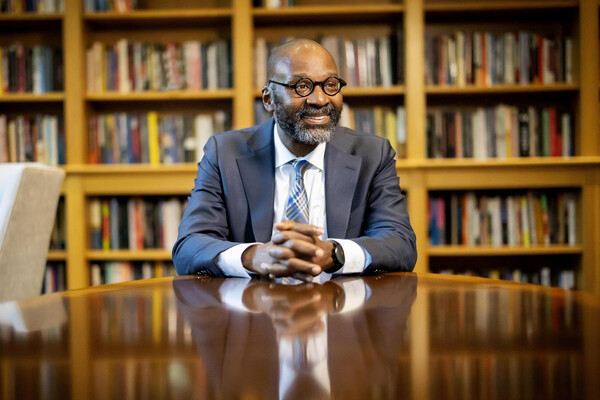
Griffin Pitt, right, works with two other student researchers to test the conductivity, total dissolved solids, salinity, and temperature of water below a sand dam in Kenya.
(Image: Courtesy of Griffin Pitt)

Two days after the election, the School of Arts & Sciences hosted a timely conversation about what comes next. Political theorist Jeffrey Green moderated, engaging constitutional scholar Rogers Smith in a discussion about how the election has gone so far, what might come next, and the challenges of addressing political polarization both now and in the future.
With 2020 being an “election unlike any other,” Green first asked Smith to share his general reactions to how things have gone so far. On the positive side, Smith said, there was no widespread voter intimidation or outbreaks of violence, and Election Day operations proceeded smoothly despite the many challenges posed by the pandemic. “A lot of things worked relatively well, and we can feel good about that as a society,” Smith said.
At the same time, he said, the election was much closer than expected, underscoring two key points: “First, we are a profoundly divided society in ways that represent great challenges in resolving this election and also governing the country going forward.
“Second, those divisions show there is much more support for the kinds of policies that Trump has advanced over last four years. Not only was it a close presidential election, but the Democrats failed to capture the Senate, and they lost seats in the House, so it is clear that there is strong support for very rival visions of what America should be.”
On the topic of contentious rhetoric, Smith noted that, while Trump’s attempt to prematurely claim victory is in line with his rhetoric, it was nevertheless disturbing and unprecedented to see a major presidential contender impugning the legitimacy of the election process. “Now it raises the serious question of, when all the votes are counted and if the president loses, will he accept the election’s legitimacy? Is he going to encourage his supporters to accept that legitimacy? We got through Election Day without violence or major disruption, so whether that will continue once we get a result is a big question facing our country today,” said Smith.
When asked about the Supreme Court’s role in deciding this election, Smith said there is “no very obvious path to litigative success,” but, because the Constitution accords power for running elections to the state legislatures, there are some legal arguments that could be used to challenge election procedures in individual states. Chief Justice John Roberts, Smith believes, is likely to be “very reluctant” to put the Court into a situation where it looks to question how voters decided an election, as Smith said it would risk the Court be seen as “overreaching,” undermining its legitimacy.
Smith also responded to recent discourse around “court packing,” which surfaced following the death of Justice Ruth Bader Ginsburg. He did not see an immediate need for an expanded Supreme Court unless, as happened during the New Deal era, the court makes it difficult to pass initiatives related to economic recovery. “I would put talk of court packing on the back burner and would turn to it only if the nation seemed to have no other way to move forward in solving its problems,” he said. Smith had similar thoughts about the Electoral College, stating that, while he considers it “one of the worst of America’s constitutional institutions,” it would be difficult to challenge since it can only be altered by a constitutional amendment
One of the most important issues to address, said Smith, is the nation’s political polarization. “There’s no question that polarization is severe in modern America, and it’s causing severe problems for effective governance,” he said. This has arisen in part, he said, through a combination of economic and cultural anxieties that voters feel the political establishment is not adequately addressing. “Finding ways to respond effectively to those economic and cultural grievances, as can be done consistently with the rights of all and for the good of the country, is a major challenge for the president-elect,” said Smith. “It is the greatest difficulty we face.”
With his long history of scholarship focused on the issue of American identity, Smith doesn’t think that Americans are likely to agree on a single story of their country, but he does see shared elements, even amongst the country’s most disparate narratives. Moving forward, he says, requires “the commitment of the Constitution, of a more perfect union,” in a way that has not come to fruition through this election.
“I hoped that we would decide that is not who we are, that we would send a clear message that the commitment to building more perfect union is who we wanted to be. We didn’t get that message. We failed to make an emphatic statement on more inclusive and egalitarian conceptions of America this time,” said Smith. “But this election is not the last word. We can go forward, and we can still work for that.”
For upcoming events related to the 2020 election and other topics, visit the Penn Arts & Sciences website.
Jeffrey Green is professor of political science and director of the Andrea Mitchell Center for the Study of Democracy in the School of Arts & Sciences at the University of Pennsylvania.
Rogers Smith is the Christopher H. Browne Distinguished Professor of Political Science in the School of Arts & Sciences at the University of Pennsylvania.
Erica K. Brockmeier

Griffin Pitt, right, works with two other student researchers to test the conductivity, total dissolved solids, salinity, and temperature of water below a sand dam in Kenya.
(Image: Courtesy of Griffin Pitt)

Image: Andriy Onufriyenko via Getty Images

nocred

Provost John L. Jackson Jr.
nocred